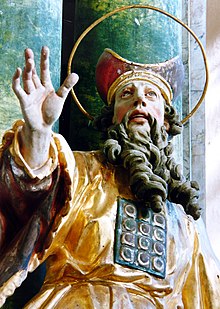BWV 167
|
Ihr Menschen, rühmet Gottes Liebe BWV 167 |
|
|---|---|
| Church cantata by J. S. Bach | |

Zechariah (topic of the cantata), by Anton Sturm, 18th century
|
|
| Occasion | Feast of St. John the Baptist |
| Performed | 24 June 1723: Leipzig |
| Movements | 5 |
| Cantata text | anonymous |
| Chorale | "Nun lob, mein Seel, den Herren" |
| Vocal | SATB solo and choir |
| Instrumental |
|
Johann Sebastian Bach composed the church cantata Ihr Menschen, rühmet Gottes Liebe (You people, glorify God's love),BWV 167, in Leipzig for the Feast of St. John the Baptist (German: Fest Johannes des Täufers, also Johannistag) and first performed it on 24 June 1723. It is part of his first cantata cycle in Leipzig.
Bach composed Ihr Menschen, rühmet Gottes Liebe in his first year in Leipzig for St. John's Day, soon after he had taken up his position as Thomaskantor. He had delivered an ambitious cantata in 14 movements, Die Elenden sollen essen, BWV 75, in the first service as cantor on 30 May 1723. In comparison, his first cantata for a saint's feast day in five movements is small scale.
The prescribed readings for the Sunday were from the Book of Isaiah, "the voice of a preacher in the desert" (), and from the Gospel of Luke, the birth of John the Baptist and the Benedictus of Zechariah (). The unknown poet took some phrases from the Gospel, such as the beginning of movement 2, "Gelobet sei der Herr Gott Israel" (Praise be to the Lord God of Israel), as in the canticle. The poetry follows the thought that Jesus, born of a woman (des Weibes Samen), is predicted to redeem sins, which are represented by the image of the serpent. The poetry concludes with the request to sing praises like Zechariah, fulfilled in the closing chorale, the fifth stanza of Johann Gramann's "Nun lob, mein Seel, den Herren" (1549).
...
Wikipedia
